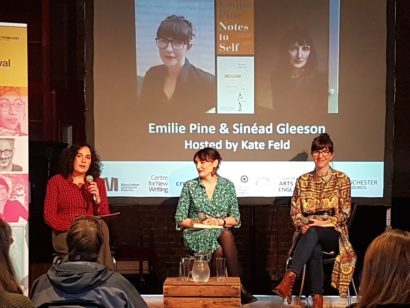 MLF Chapter & Verse
MLF Chapter & Verse
The Manchester Literature Festival Blog
Review: Emilie Pine & Sinead Gleeson
Erin McNamara, student at the Centre for New writing, considers the multiplicity of writing by women.
Emilie Pine and Sinéad Gleeson were interviewed by Kate Feld at the International Anthony Burgess Foundation on 13th October.
After introductions, Gleeson read from an essay entitled ‘On the Atomic Nature of Trimesters’ from her collection Constellations, and Pine from the first of her book Notes to Self – ‘Notes on Intemperance’. While very different in subject matter, the similarities between the two essays contained the core of the discussion between Feld, Gleeson and Pine – the essay as a form, and its many possibilities. Both essays were personal, dealing with medical issues and deeply emotional – and the essay form frees Pine and Gleeson from the potential restrictions of those themes.
Gleeson explained that she chose to write essays because of their versatility – in her words, they are ‘very bendy’. She didn’t just want to write about herself, or about illness, and the form lent itself to wider discussions of culture, politics and society. She described the way a subject might morph into three or four different discussions, and that writing her way through these different ‘tentacles’, as she had it, enabled her to ask questions of herself and work out how she felt about the answers. For Pine the cathartic potential of essays was important – she needed to write about her father’s alcoholism in order to get it out of herself, to process it. However, she is wary – as is Gleeson – of the connotations of personal work by women. She describes her essays as ‘personal and intellectual at the same time’, commenting that the two things ‘are not mutually exclusive’.
A lot of the discussion revolved around the assumptions that women are constantly having to overcome as writers. Feld, Pine and Gleeson discussed how work is often assumed to be autobiographical, how it is expected to be full of pain and messy biology. These assumptions were clearly familiar to the audience, and the discussion was punctuated with many nods and laughs from the women watching. Kate Feld prompted a discussion about the connotations of the word ‘raw’, pointing out that it has been used to describe both collections. While it was used positively, both Pine and Gleeson railed against the implication that their work didn’t require effort or skill, merely turned up fully formed. Pine pointed out that the editing process turns something that might have begun as quite visceral into the very opposite. Gleeson described the essay form as a ‘highly crafted thing’, not, as the word ‘raw’ implies, an off-the-cuff monologue that only needed writing down.
After the interview Kate Feld opened the discussion up to audience questions. The main theme of these questions was feminist, discussing Irish feminism in particular. Pine’s take on the current wealth of Irish feminist writers – especially those writing starkly and matter-of-factly about mental health, illness and issues such as abortion and reproductive health – was that it shouldn’t be radical to see these kinds of things written down. It becomes radical because of the extent to which women’s experience is not discussed. Gleeson referred to the ‘generations of silencing’ that has prevented women from telling their stories, saying that the influx we see at the moment results from the relaxation of that silencing. As these writers continue to push the boundaries of what can be under discussion, we can but hope the wider discussion around the multiplicity of what women’s writing can do will open as well.
